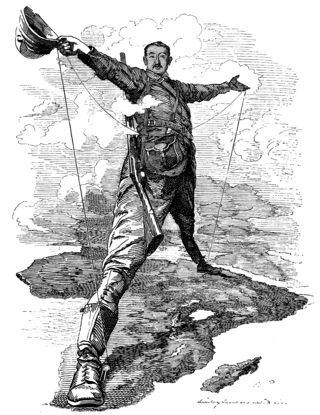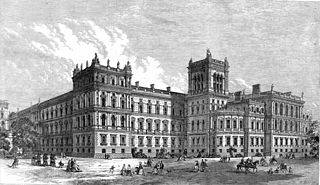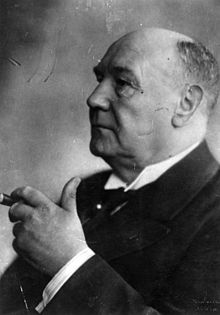
The British Empire was composed of the dominions, colonies, protectorates, mandates, and other territories ruled or administered by the United Kingdom and its predecessor states. It began with the overseas possessions and trading posts established by England in the late 16th and early 17th centuries. At its height in the 19th and early 20th century, it was the largest empire in history and, for a century, was the foremost global power. By 1913, the British Empire held sway over 412 million people, 23 per cent of the world population at the time, and by 1920, it covered 35.5 million km2 (13.7 million sq mi), 24 per cent of the Earth's total land area. As a result, its constitutional, legal, linguistic, and cultural legacy is widespread. At the peak of its power, it was described as "the empire on which the sun never sets", as the sun was always shining on at least one of its territories.

Imperialism is the practice, theory or attitude of maintaining or extending power over foreign nations, particularly through expansionism, employing not only hard power, but also soft power. Imperialism focuses on establishing or maintaining hegemony and a more or less formal empire.
Responsible government is a conception of a system of government that embodies the principle of parliamentary accountability, the foundation of the Westminster system of parliamentary democracy. Governments in Westminster democracies are responsible to parliament rather than to the monarch, or, in a colonial context, to the imperial government, and in a republican context, to the president, either in full or in part. If the parliament is bicameral, then the government is responsible first to the parliament's lower house, which is more representative than the upper house, as it usually has more members and they are always directly elected.

The Thirteen Colonies were a group of British colonies on the Atlantic coast of North America founded in the 17th and 18th centuries. The American Enlightenment led these colonies to the American Revolutionary War. They declared independence as the United States of America in July 1776, which was achieved by 1783 under the Treaty of Paris.

The secretary of state for the colonies or colonial secretary was the Cabinet of the United Kingdom's minister in charge of managing the British Empire.

Kamerun was an African colony of the German Empire from 1884 to 1920 in the region of today's Republic of Cameroon. Kamerun also included northern parts of Gabon and the Congo with western parts of the Central African Republic, southwestern parts of Chad and far northeastern parts of Nigeria.

The flag of Samoa was first adopted from 24 February 1949, for UN Trusteeships, and continuously applied for the state's independence on 1 January 1962. It consists of a red field with a blue rectangle in the canton. The blue rectangle bears the Southern Cross: four large white stars and one smaller star.

Schutztruppe was the official name of the colonial troops in the African territories of the German colonial empire from the late 19th century to 1918. Similar to other colonial armies, the Schutztruppen consisted of volunteer European commissioned and non-commissioned officers, medical and veterinary officers. Most enlisted ranks were recruited from indigenous communities within the German colonies or from elsewhere in Africa.

The German colonial empire constituted the overseas colonies, dependencies, and territories of the German Empire. Unified in the early 1870s, the chancellor of this time period was Otto von Bismarck. Short-lived attempts at colonization by individual German states had occurred in preceding centuries, but Bismarck resisted pressure to construct a colonial empire until the Scramble for Africa in 1884. Claiming much of the remaining uncolonized areas of Africa, Germany built the third-largest colonial empire at the time, after the British and French. The German colonial empire encompassed parts of several African countries, including parts of present-day Burundi, Rwanda, Tanzania, Namibia, Cameroon, Gabon, Congo, Central African Republic, Chad, Nigeria, Togo, Ghana, as well as northeastern New Guinea, Samoa and numerous Micronesian islands.

Togoland was a German Empire protectorate in West Africa from 1884 to 1914, encompassing what is now the nation of Togo and most of what is now the Volta Region of Ghana, approximately 90,400 km2 in size. During the period known as the "Scramble for Africa", the colony was established in 1884 and was gradually extended inland.
Imperial Preference was a system of mutual tariff reduction enacted throughout the British Empire as well as the then British Commonwealth following the Ottawa Conference of 1932. As Commonwealth Preference, the proposal was later revived in regard to the members of the Commonwealth of Nations. Joseph Chamberlain, the powerful colonial secretary from 1895 until 1903, argued vigorously that Britain could compete with its growing industrial rivals and thus maintain Great Power status. The best way to do so would be to enhance internal trade inside the worldwide British Empire, with emphasis on the more developed areas — Australia, Canada, New Zealand, and South Africa — that had attracted large numbers of British settlers.

British America comprised the colonial territories of the English Empire, and the successor British Empire, in the Americas from 1607 to 1783. These colonies were formally known as British America and the British West Indies immediately prior to thirteen of the colonies seceding in the American Revolutionary War (1775–1783) and forming the United States of America.

The Imperial Colonial Office or Reich Colonial Office was a governmental agency of the German Empire tasked with managing Germany's overseas territories. Dissolved after World War I, on 20 February 1919 the Reich Colonial Ministry of the German Weimar Republic replaced the Imperial Colonial Office, dealing with settlements and closing-out of affairs of the occupied and lost colonies.

The Colonial Office was a government department of the Kingdom of Great Britain and later of the United Kingdom, first created in 1768 from the Southern Department to deal with colonial affairs in North America, until merged into the new Home Office in 1782.

The Reichskolonialbund (RKB) was a collective body that absorbed all German colonial organisations during the time of the Third Reich. It was led by Franz Ritter von Epp.

The Kiautschou Bay Leased Territory was a German leased territory in Imperial and Early Republican China from 1898 to 1914. Covering an area of 552 km2 (213 sq mi), it centered on Kiautschou Bay on the southern coast of the Shandong Peninsula. The administrative center was at Tsingtau (Qingdao). It was operated by the East Asia Squadron of the Imperial German Navy. The Russian Empire resented the German move as an infringement on Russian ambitions in the region.
The 1897 Colonial Conference was a conference between the Secretary of State for the Colonies and the 11 self-governing colonies of the British Empire. The conference was convened in London by Colonial Secretary Joseph Chamberlain in 1897 on the occasion of the Diamond Jubilee of Queen Victoria. Chamberlain's intention was to draw the self-governing colonies into closer co-operation with the United Kingdom.
The NSDAP Office of Colonial Policy was a Nazi Party office formed in 1934. Its stated objective was to formulate plans for the re-taking of the former German colonies. The office lost much of its meaning after the start of World War II, and was dissolved after the reversal of Nazi Germany's military victories in 1943.
Ministry of the Colonies may refer to:
Cinema in Togo began with German colonial filmmakers visiting Togoland. The French attempted to suppress cinema in French Togoland. After the Togolese Republic gained independence in 1960, Togo's national government encouraged cinema, though government support for cinema lapsed when French funding was withdrawn in the 1990s. More recently, however, the film industry is once again growing in Togo.



















